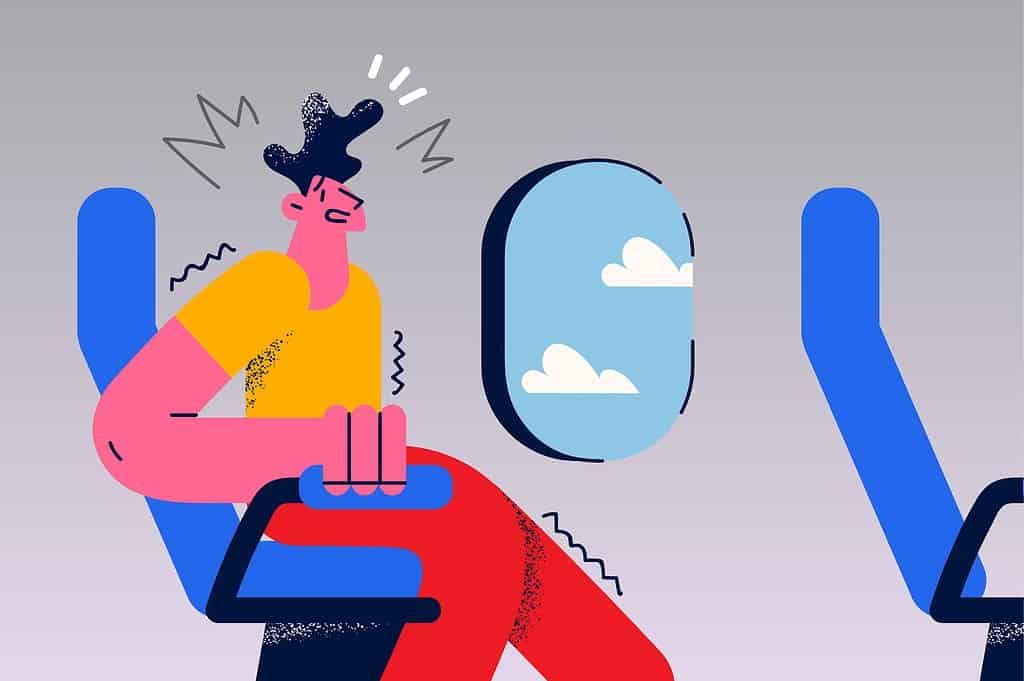The Risks of Flying

BDD – GMD
Flying can cause temporary effects, such as ear discomfort, jet lag, and dehydration. It can also increase the risk of deep vein thrombosis (DVT). However, many people take flights without any health complications.
__________
People who travel on airplanes may have concerns about the potential effect flying has on the body, particularly if they fly regularly. However, it is not common for people to experience health conditions or complications directly due to flying.
This article examines some possible effects of flying, how to reduce the risk of developing such conditions, and frequently asked questions about health and flying.
__________
🟥
DVT is when someone forms a blood clot in a deep vein, such as those in the legs. According to the Centers for Disease Control and Prevention (CDC), traveling for 4 or more hours is a risk factor for DVT. This includes flying but also car, bus, and rail travel.
__________
DVT arises during travel because people sit still in confined spaces for long periods. The following factors can increase a person’s risk of developing blood clots:
- being more than 40 years of age.
- obesity.
- having had surgery or an injury within 3 months.
- using birth control that contains estrogen.
- pregnancy and the postpartum period.
- hormone replacement therapy.
- having had a previous blood clot.
- a family history of blood clots.
- active cancer or recent cancer treatment.
- having limited mobility.
- varicose veins.
Increased blood pressure
According to a 2021 studio, flying has the potential to increase blood pressure. This is because commercial flights take place at very high altitudes, which can cause changes to the cardiovascular system.
These include an increased heart rate, more contracted heart muscles, and changes in how much blood the heart can pump.
Some people are more susceptible to these effects, including people with:
The paper’s author suggests stressful factors due to the flight may also affect blood pressure, including:
- anxiety during take-off and landing.
- aircraft noises.
- changes in body position as the airplane accelerates and decelerates.
Ear discomfort
Some people may experience ear discomfort while flying. Doctors sometimes call this “airplane ear.”
According to a 2019 article, this arises due to the sudden changes in air pressure and altitude during commercial flights. It can manifest as pain, hearing loss, and problems with balance.
Although airplane ear can happen to anyone, the following factors may increase a person’s risk:
- common cold.
- sinusitis.
- allergic rhinitis.
- ear infections.
- having a small eustachian tube, which connects the middle ears to the back of the nose and throat.
Dehydration
According to a 2020 narrative review, there are many ways in which air travel can lead to dehydration.
For instance, the air inside flight cabins is usually dry and lower in pressure. This can cause water to more quickly evaporate during breathing and from the surface of the skin.
People may also drink less during flights than they ordinarily would. Finally, jet lag may lead to disruptions in someone’s drinking habits.
However, the authors highlight that further research is necessary to determine the exact dehydrating effect of flying.
Jet lag
According to the CDC, jet lag occurs when someone’s usual daily rhythms do not align with a new time zone.
This sleeping issue typically arises when traveling across at least three time zones, but it can arise from smaller disruptions. Jet lag can cause problems with mood, concentration, and tiredness.
Although jet lag can occur regardless of what direction a person travels, a 2018 analysis suggests flying eastward may increase the risk of jet lag.
Other effects
Airplanes are confined spaces where people usually experience proximity to others. Although the CDC recommends that individuals with acute or infectious illnesses, such as influenza, delay their travel, this may not always happen.
People on airplanes may be at risk of acquiring a virus through direct contact, such as touching the same surfaces as someone with an active, acute infection.
According to the CDC, cabin air pressure can contribute to dry eyes and worsen certain chronic conditions like anemia, heart difficulties, and lung issues.
According to the CDC, the most common medical events that occur on airplanes include:
Some people who are pregnant may also experience restrictions on airplane travel, such as those who are past 36 weeks’ gestation.
__________
🟡 🔴 🔵 REMEMBER
__________
The way to prepare for a flight depends on how long you’re traveling and your specific health conditions.The United Kingdom’s National Health Service suggests:
- wearing loose, comfortable clothing.
- using compression socks.
- walking around during long flights.
- keeping hydrated.
- storing luggage overhead to give the legs more room.
- avoiding alcohol, caffeinated drinks, or sleeping medication.
- performing regular anti-DVT exercises, such as heel raises.
- getting plenty of rest before traveling.
- changing sleeping routines before flying to reduce the risk of jet lag.
- avoiding large meals before traveling.
- taking medication, such as antihistamines, to help prevent travel sickness.
People can also speak with a healthcare professional before flying if they have concerns about their health on the trip.
__________
